At the wheel: James Mills
Owned since: July 2019
Current condition: Original
Hands-on or hands-off? Off! My hands are only fit for handling a keyboard
James Mills is Editor at Hagerty. He spent most of the 90s and noughties in cars at test tracks, wearing out their tyres and his editors’ patience as he reported for the likes of Auto Express, Top Gear and The Sunday Times Driving. Naturally, when the time came to put something in the garage, he gravitated to cars of the same era. Scroll down to read all the updates on the M3.

23 February, 2021: Welcome to my BMW M3
I blame Twitter. A couple of summers ago, when ‘lockdown’ was a term rarely bandied about outside the walls of HMP Belmarsh, Jesse Crosse, a Hagerty contributor, announced to the world – well, his Twitter followers – that he was selling his 2003 BMW M3.
Being sufficiently long in the tooth to have driven every generation of BMW 3 Series and associated M3 since the E30 had to be homologated for motor racing, I knew two things. I’d long-since missed the boat to afford an E30. And of any M3, the third-generation E46 M3 had an engine that could never be improved on. I phoned Jesse out of the blue and uttered the immortal words, “When can I come a see the car?”
From that point on he must have known he had me. I’d been watching E46’s for some time and running the man-maths through my head, as I hunted for a foil to an Integra Type-R DC2 already in the garage.
The Titanium Silver example was entirely original – nothing remotely close to concours, but unspoilt, intact and ready to receive some attention. It had done 71,000-odd miles, came with the manual six-speed gearbox and didn’t have a sunroof. These were all boxes that had to be ticked. The only one that wasn’t concerned the alloy wheels. It was fitted with the larger 19-inch wheels that were a hugely popular option from new.
As a purist, I wanted the double-spoke Satin Chrome-finish 18-inch wheels because they wear taller tyres and weigh less, which subtly but oh-so-satisfyingly alters the way the M3 rides, steers and progresses from grip to OH-MY-GOD-THIS-IS-THE-END-WHY-DID-I-SWITCH-OFF-THE-DSC? But what the heck; Google would surely come to my rescue with a set of original 18-inch wheels. (You’ll have to wait for my next report to read about that saga…)
It was a clean, honest car that would need some attention, primarily to its front wings, one of which was starting to bubble on the surface like a bowl of hot soup. There was BMW and specialist service history. And the boot floor had been reinforced around where the rear subframe attaches to the structure. My budget was around £15,000, but I’d struggled to find original cars with medium mileage in that price range. Jesse was advertising his car for £13,750.
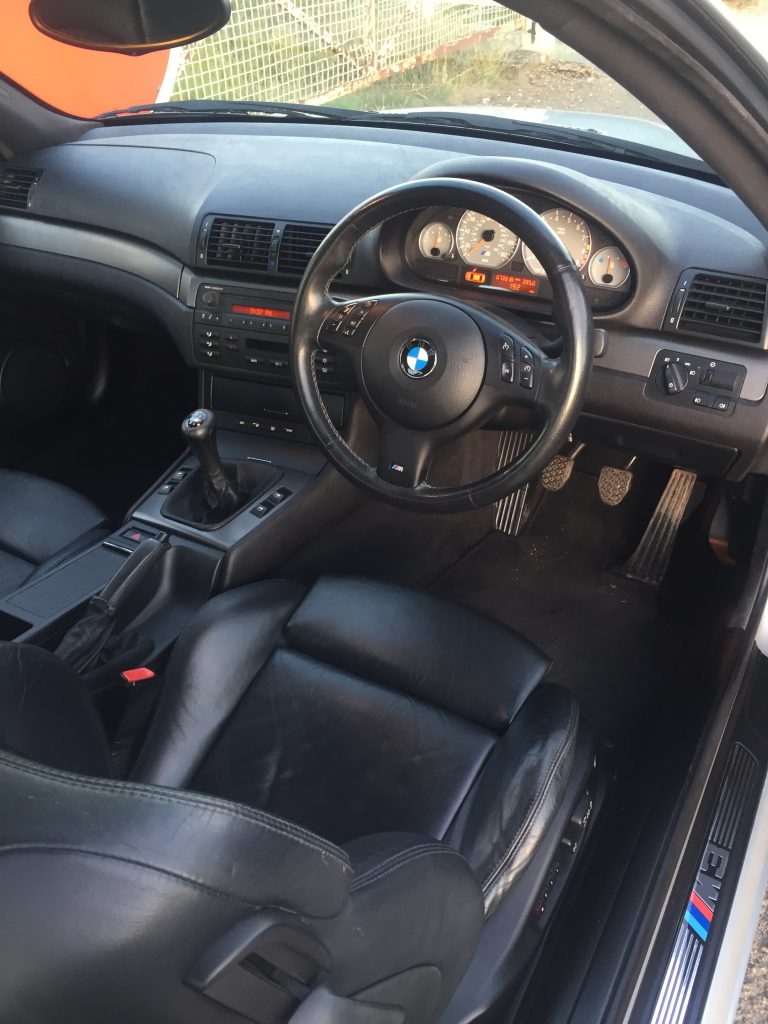
A classic case of too good to be true? Well, I knew Jesse, and knew he knew how to look after a car. I also knew he was straight-talking. The car, he assured me, was priced realistically – an increasingly rare occurrence in the age of the hyper-inflated ‘modern-classics’ car scene.
It drove much as I’d hoped it would, with one exception. When the rear subframe work was done, Jesse took the opportunity to switch the standard BMW suspension bushes to polybushes. That made it a little unyielding for my tastes; great for track days, not so great for when children have flown the nest and Mr and Mrs Mills want to set off on a grand tour of France. Yes, I wanted a car like the M3 as much for its usability as its rear-wheel drive, tyre-smoking performance.
After speaking with Barney Halse at Classic Heroes, my mind was put to rest. Barney and his team had been over the car and noted what would need doing to it, in advance of a potential part-exchange for another BMW that Jesse was had his eye on. Jesse, presumably wanting more money out of his M3, tried the private sale route first.
We shook hands – as best you can shake hands over the telephone – at £13,250. I jumped on a train, met Jesse at his local station, sorted out the paperwork and before I knew it the funds had cleared, insurance was in place and I was cruising back home with an S54 – the holy-grail of straight-six engines – at my beck and call.
There is much to report on since then. But that will have to wait for future updates. Meanwhile, if you’re a BMW M3 fan or owner, I’d like to hear from you. Do share your experiences in the comments area, below.
Tweet to @squarejames Follow @squarejames9 March, 2021: Wheely good news
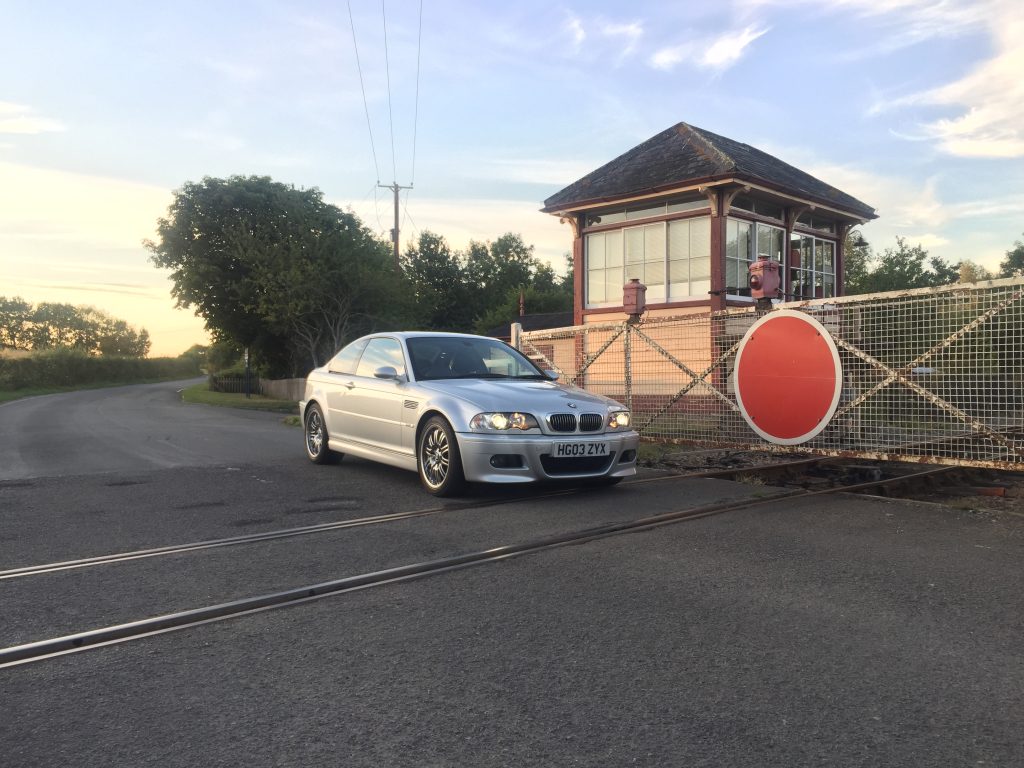
T’internet was practically invented for car enthusiasts. In fact, didn’t Tim Berners-Lee once say that it wasn’t nuclear scientists that were at the forefront of his mind when creating the World Wide Web?
Perhaps I’m imagining it, but I could have sworn Mr Berners-Lee was thinking of Barry over in Essex, who needs a part for his original Ford Escort RS1600? Rather than buy up every regional copy of Friday Ad and Exchange & Mart, browse all the Ford owners club fanzines and stop to look at the postcard ads in every newsagent’s window wherever he goes, the smart-thinking boffin knew that if you could make all the information available in one place at the click of a button, Barry might stand half a chance of sourcing an original door card for his Escort. Perhaps.
Which is how I came to be lying on the sofa one night, merry on a glass or two of red wine and opening the eBay app on my phone.
Into the search bar went ‘BMW M3 E46 alloy wheels’ and back came the usual vision-blurring array of eBay offerings. And most of them were the same design of wheels already fitted to my car – the imaginatively titled M Double Spoke (style 67) 19 inch polished and forged alloy wheel.
This called for brain power, ingenuity and cunning all rolled into one devasting move. So I added ‘18 inch’ onto the end of the search term. See what I did there?
Success! There were several options, but one seemed more promising than most. Someone was selling what they claimed to be an original set of 18 inch Satin Chrome-finish M3 wheels which, they said, were as good as new.
After a call the next day, it turned out that said someone was in the motor trade. The owner of Brittle Motor Group, a luxury car dealer near Stoke-on-Trent, Staffordshire, had taken in a months-old BMW M3 as a part-exchange, early in the lifetime of the M3 E46. When they put the car back on the market, a buyer wanted rid of the original 18 inch alloys, in favour of the larger 19s. It was a popular swap back then, mostly down to aesthetic tastes – the larger wheels filled out the wheelarches, pleasing those that value stance over how a car rides, steers and handles on a bumpy bit of B-road.
So the 18s had been removed, placed in a windowless storeroom for the next 16 years, waiting for a nerd like me to come along.
After pictures and video clips were exchanged, we made a verbal handshake at £850, including the as-new Continental Contact Sport tyres and delivery. A few days later, a man with a van lorry pitches up, unloads with an electric-forklift and I get to unwrap a small mountain of plastic wrapping. With that out of the way, I can remove each wheel and check them over.
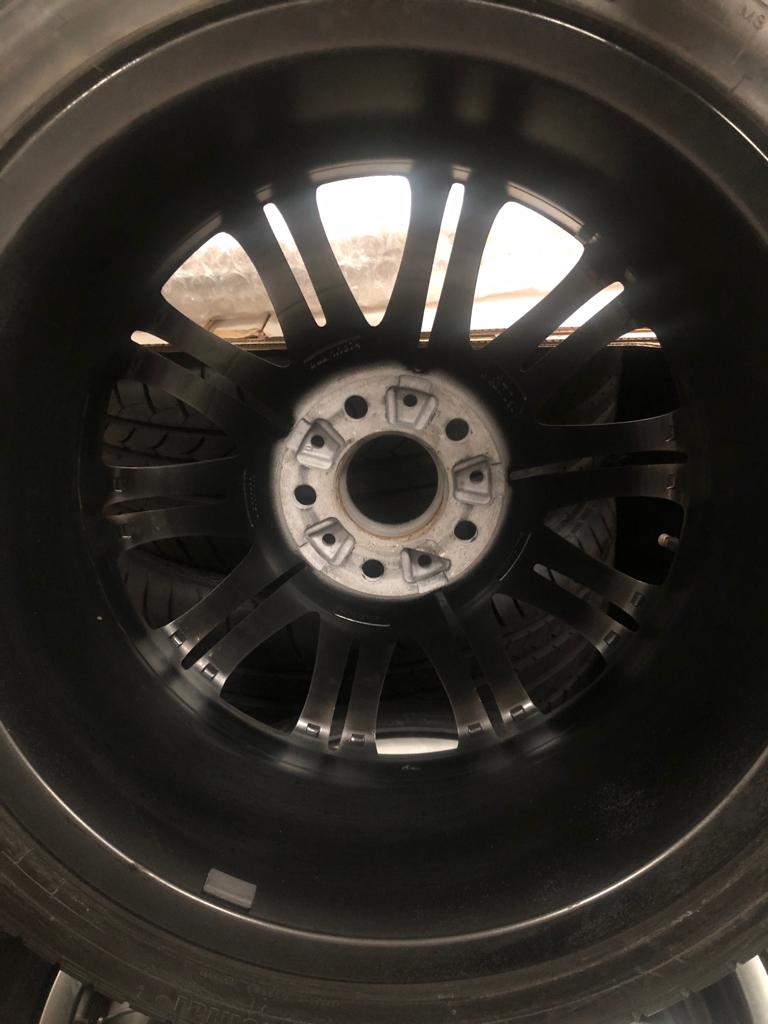
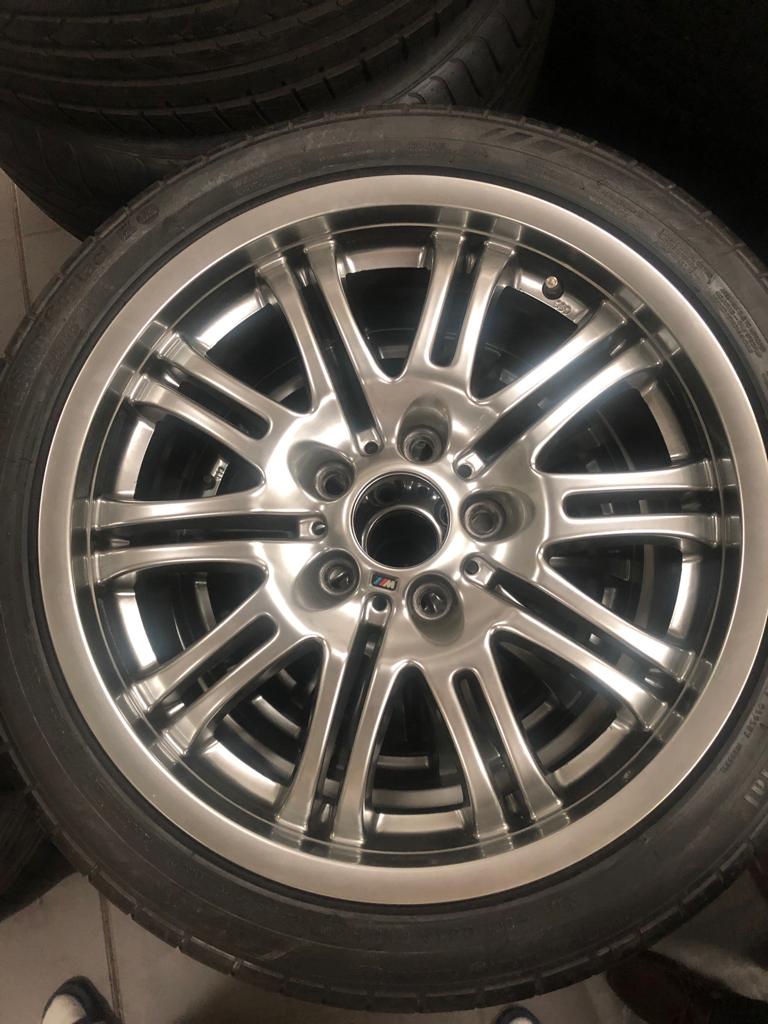
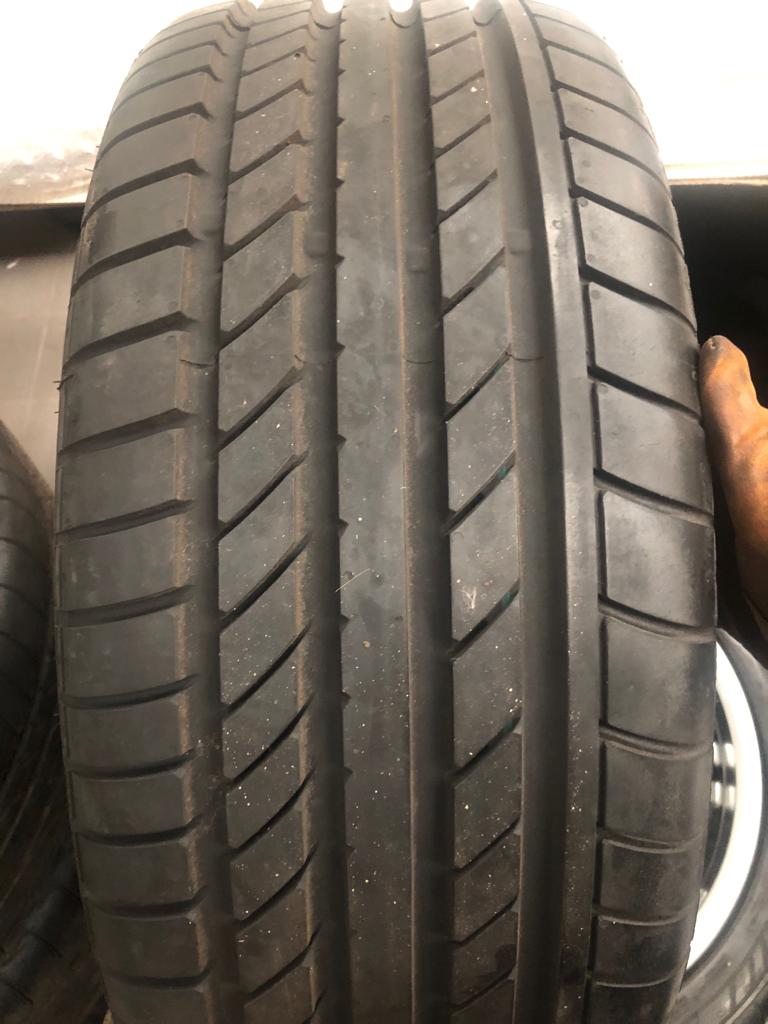
Sure enough, they were – literally – as good as new. The tyres still had their rubber nipples all over the sidewalls, there were no blemishes on the tread blocks and each wheel was shiny enough to eat your dinner off. They appeared to have travelled no more than running-in distance.
Out came the trolley jack. Off came the 19-inch wheels, and on went the 18s, with the 18×8 inch (225/45 ZR) at the front and the wider, 18×9 inch (255/40 ZR) at the back. (Hey, I’m mechanically inept, but not that mechanically inept.)
I’d spoken with a subjective evaluation engineer (that’s a tyre tester to you and me) from a tyre manufacturer. They’d suggested that the tyres would be safe to use should they have been stored out of daylight and if there were no visible outward change, such as crazing of the sidewalls. Sure enough, they felt fine to the touch, displayed no visible difference to a new tyre and seemed to perform as expected on the road, but a new set of Continental tyres is next on my To Do list.
The difference was marked. The M3’s ride comfort improved, with added pliancy in all conditions, but especially when cracking on along the miserable excuse for the roads we get in our part of Kent, where country roads keep tyre sidewalls, springs and dampers working overtime.
The downside to all this driving goodness was that something with the M3 went rather wrong on a roundabout. And no, it’s not what you’re thinking. All will be revealed in my next update…
14 May, 2021: Blowing hot and cold
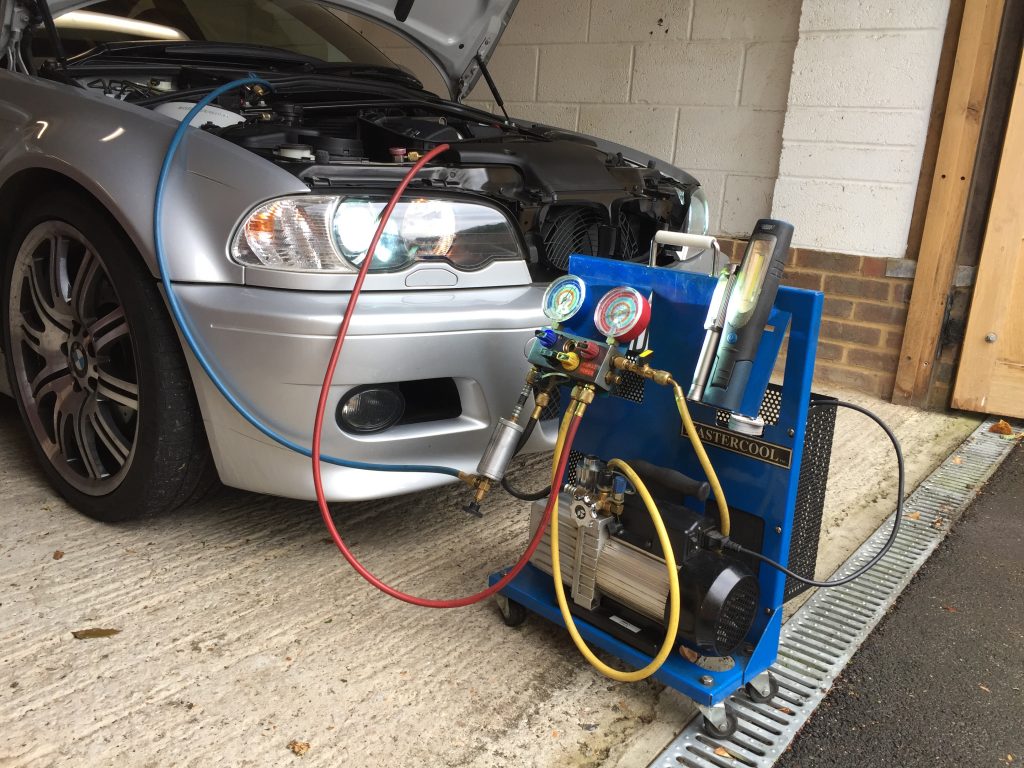
Buying an old car can be thrilling for those who like to roll the dice and see what score comes up but for anyone of a nervous disposition an old car probably leaves them faintly terrified. That’s especially true if you know you’re on a budget and any bills out of the blue will mean the home’s leaky roof and wonky chimney stack won’t get repaired anytime soon, the children will have to sell their toys and clothes on Depop, and all meals will be largely gruel and water based, with a side serving of earthworms from the garden – just so mum or dad can afford to continue their hobby of messing about with classic cars.
So as the weather in July 2019 heated up, I felt a chill run down my spine. Punching in increasingly lower temperatures on the M3’s climate control system, the air flowing into the cabin remained distinctly temperate. My Spidey-sense (and sweaty back) told me something was broken.
Shortly after that, I took the M3 to Classic Heroes, a specialist in enthusiast performance cars with a background in BMWs – it was founded by Barney Halse, one of the Halse family that founded Munich Legends. Barney and the team gave the M3 an appraisal, listing the jobs that would need doing to bring it up to the sort of condition that would make it a car Classic Heroes would happily sell to a customer. And during that inspection, it was mentioned that a new condenser could be required for the air conditioning system.
To a spendthrift like me, who was having to come to terms with parting with yet more money after only just buying the M3, shelling out on parts for the heating system seemed as appealing as handing over my bank account number and sort code to the Romanian Prince emailing to ask for help with a bail bond.
My hunch was that the air conditioning system had probably never been serviced in its 16-year lifetime. So I found a local chap specialising in the service and repair of cars’ air conditioning system. Tom Featherstone, based in Wittersham, Kent, has been working in the field since 2005, starting after retiring. Certified and licensed (F Gas Approved), he came out and gave the M3’s system a check over and service – and me a lesson in how it all works.
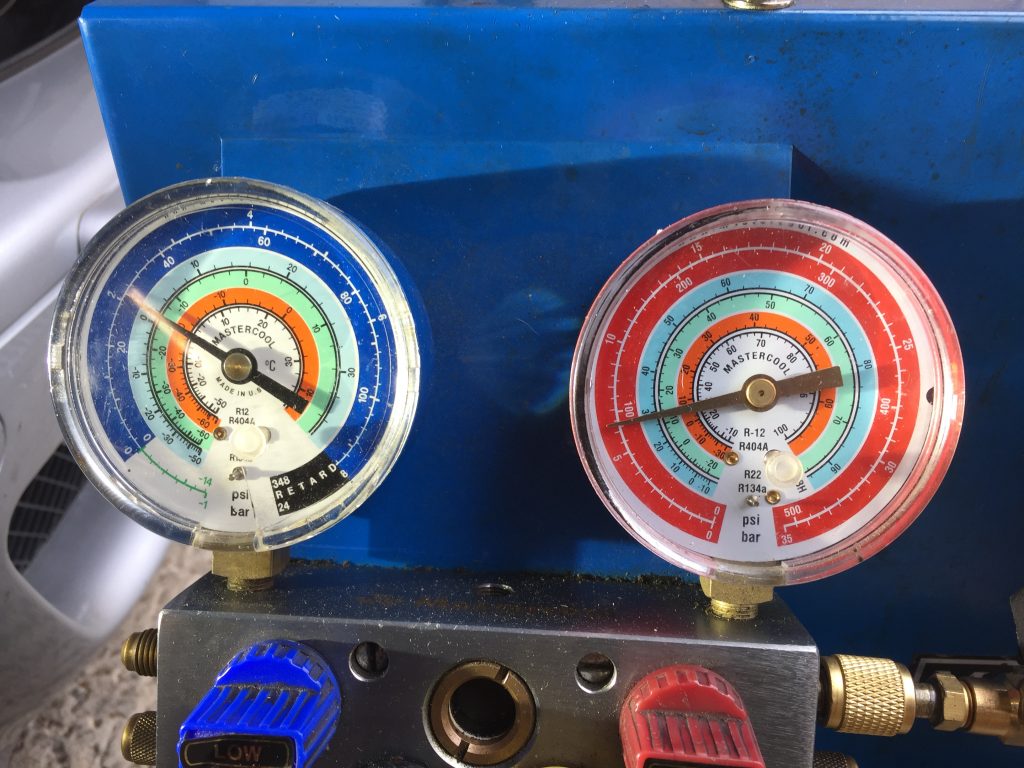
After checking the compressor’s electro-magnetic clutch was working correctly, Featherstone explained that “if you run out of gas completing or get very low, a pressure switch shuts down the compressor, because if you run it without gas you’ll overheat the compressor.” He also sees that the cooling system’s electric fan is working correctly.
About 10 per cent of gas is lost annually, said Featherstone, and common problems include condensers damaged by stones or corroded pipes. The worst thing any driver can do is switch off their air conditioning in the Autumn and turn it back on in the Spring. “There is oil in there with the gas, so if you turn it off the seals will dry out and that can lead to leaks.”
Happily, the M3’s air conditioning hardware appears to be in immaculate condition. So Featherstone moves on to checking the system’s gas health. The manufacturer specifies a quantity of gas to be held in the system – in this car’s case 1.65Ibs (740g) – and the only way to find out what’s remaining is to draw out the existing gas, weigh it, then fill the system with new gas. To do his, Featherstone uses a manifold set with a vacuum pump and recovery unit and cylinder, and weighs the gas recovered from the system which tells him whether there’s a shortage.
With the gas removed, he performs a pressure test using nitrogen, which isn’t entirely foolproof. To be entirely certain there are no leaks, he’ll run some gas through and perform a ‘sniffer test’ – with a tool, not his nose…
The BMW had 200g of gas remaining, out of 740g, which, says Featherstone, is fairly typical for an old car that’s been well maintained otherwise. When he regases the system, he adds a touch more oil to ensure the compressor and seals remain lubricated.
It comes across as a science experiment performed on my driveway. And I’m happy to report that once the regas is performed, the climate control is blowing icy-cold. (More to the point, it continues to do so to this day, nearly two years later.) “Your car is a classic case of a car that’s old and probably never had its system serviced,” says Featherstone. It’s common and, thankfully, straightforward. I’m charged £70, which is the sort of bill I appreciate. All in all it’s a happy outcome.
What isn’t quite so happy is what happens a few months later. Driving around a large, expansive and empty roundabout, exploring, shall we say, the transition between grip and slip that the E46 generation BMW M3 so entertainingly serves up, I feel the car lurch out of line, the tail swings alarmingly wide and there is a feeling that all is not as it should be down in the depths of the rear suspension.
Further investigation would be required. I just hoped it wouldn’t result in a big bill…
Tweet to @squarejames Follow @squarejames16 June, 2021: What lies beneath
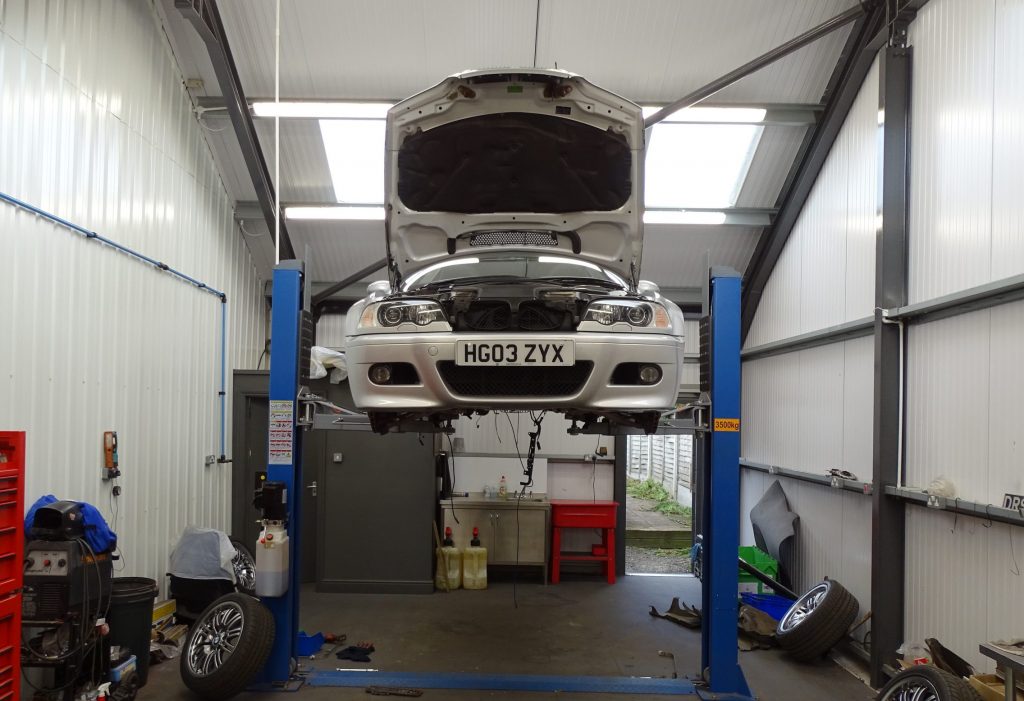
If, like me, you are the prouder own of a youngtimer, modern-classic, old car – call it what you will – then you might just imagine that all is well with the world, and your car. After all, a car like mine, that’s 18-years old and scrubs up nicely enough that it may attract one or two admiring glances from other drivers, looks presentable enough to lull you into a false sense of security.
“It’s shiny, it’s German; what could go wrong?” you might catch yourself saying. That’s a bit like buying a house without a survey – fine, so long as you don’t mind if the roof falls in.
As any experienced restorer will tell you, it’s what lies beneath that you should fear. So shortly after buying the M3, in the summer of 2019 – from contributor, Jesse Crosse – I took it over to Classic Heroes, the BMW specialists in Buxted, Sussex.
I looked around the underside of the car as they gave it an appraisal, nodding and murmuring as they poked, prodded and scraped in a knowing fashion. There were patches of surface rust, which alarmed me but not the technicians. One of the front wings was questionable, but the general impression was that there was an opportunity to preserve the car before things turned ugly.
However, the only way to tell for certain was return, hand over the car and keys and leave it with Classic Heroes to pull apart. Then all would be revealed. It was time to bite the bullet. This wouldn’t be cheap but I wanted to keep the car and enjoy driving it for decades to come. Preferably without holes in the floorpan.
When I say ‘pull apart’ I mean expose the floorpan and structure of the car. That entails removing all wheelarch liners, splashguards, heat shields, exhaust, propshaft, fuel and brake lines, rear subframe and the associated suspension and braking components and the fuel tank.
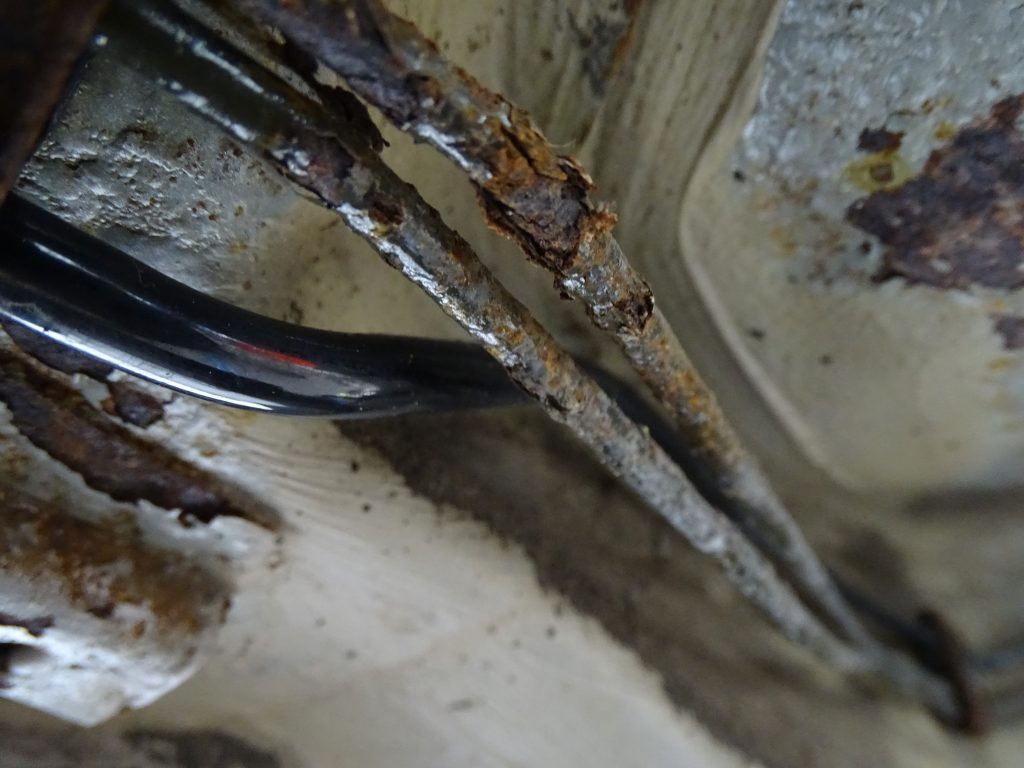
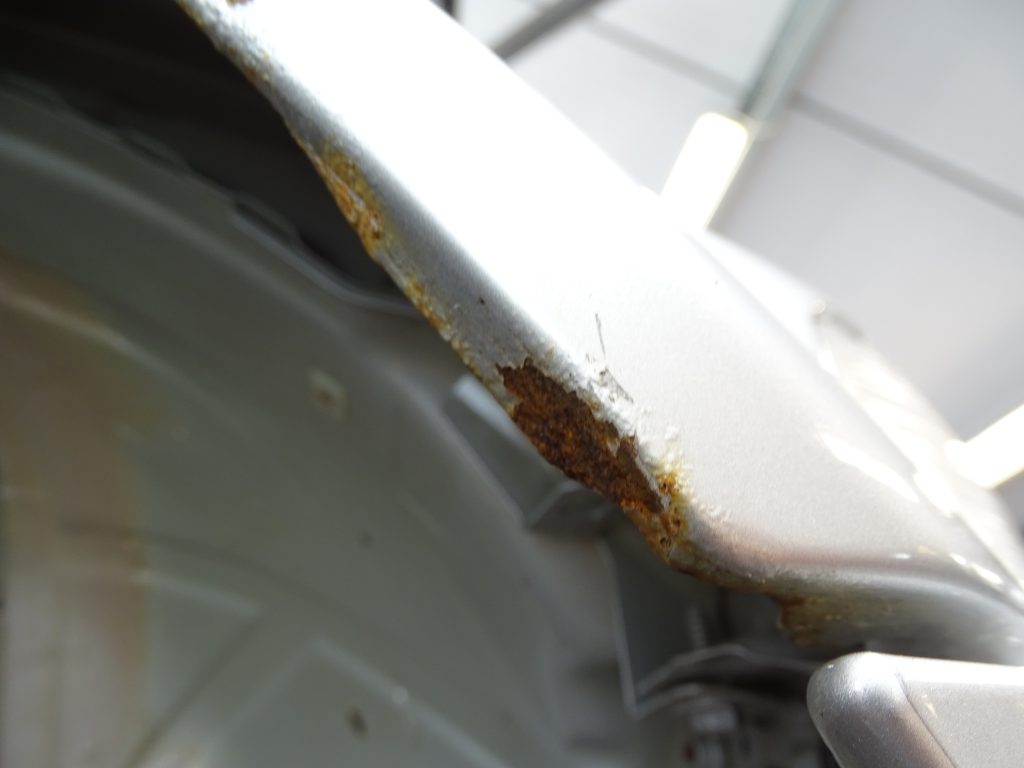
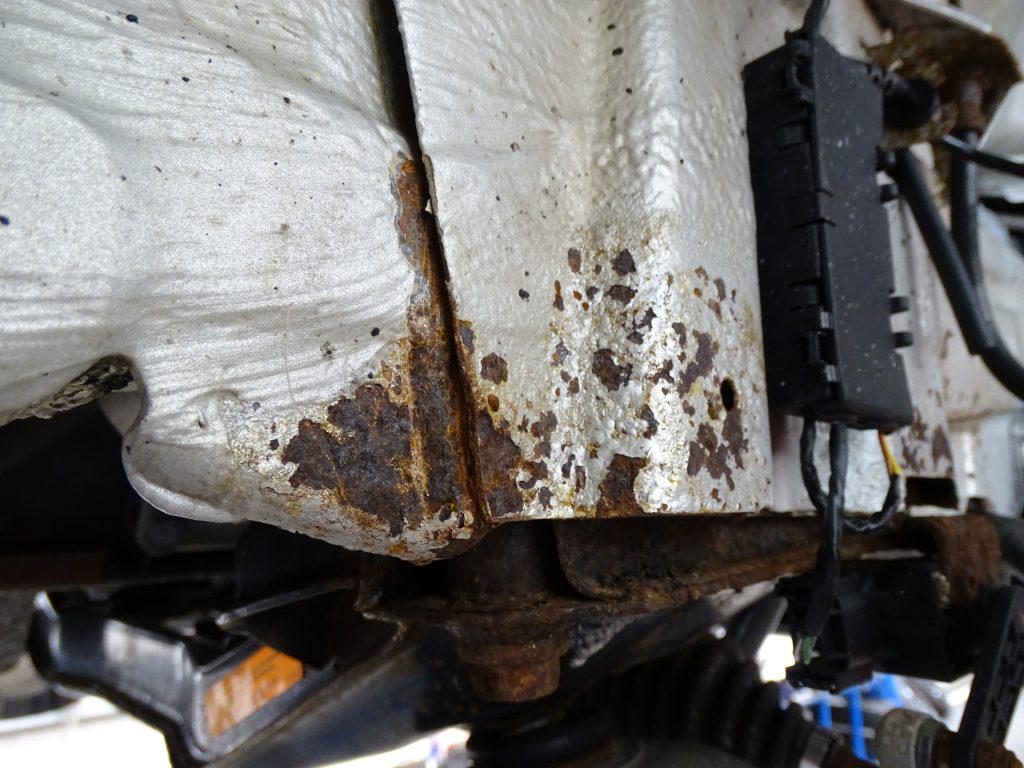
That’s when things, er, turned ugly. It was clear that intervention – “preventative maintenance”, as Barney Halse of Classic Heroes likes to say – was required. Failing to do so would see the rot well and truly set it, and before you know it the welder would rear its ugly head and things would get doubly time-consuming and costly.
The team explained it was in a better state than the many M3s of a similar age. I wandered around the car, scratched my head and did some thinking. Its mechanical condition, you could argue, makes it worth spending a small fortune on – sorry, preserving.
“Let’s do it,” I said. Then immediately went home and checked the balance on my credit card.
During all this, the cause of the curious lurch when taking a roundabout in an enthusiastic fashion was discovered. The nearside rear spring was cracked. And if the subframe had to come out, I figured it would make sense to have the recently installed poly bushes replaced with original BMW items, as the only effect as far as I could tell was they would uncomfortably compress my spine in every high-speed dip the car encountered. I also wanted to fit a new set of dampers, so looked into researching original equipment suppliers.
And that’s just the start of it. The car needed a new fan resistor fuse – a part I attempted to fix, after it packed up, but which proved to be quite literally out of my reach. The engine poly belts needed replacing. The fuel pipes and rear brake hoses would have to be changed. And then the rear exhaust box would need some skillfull bodging to preserve its life. Plus a set of rear radius arm bushes were required. And after that lot, a four-wheel alignment would be essential.
Still, why leave it there, eh? Because I’m a glutton for punishment, I suggested doing the Inspection II service at the same time, as well as a gearbox oil change.
I left the car with Classic Heroes in August. It wouldn’t be home again until December…
3 August, 2021: How would Sir like to settle the bill?
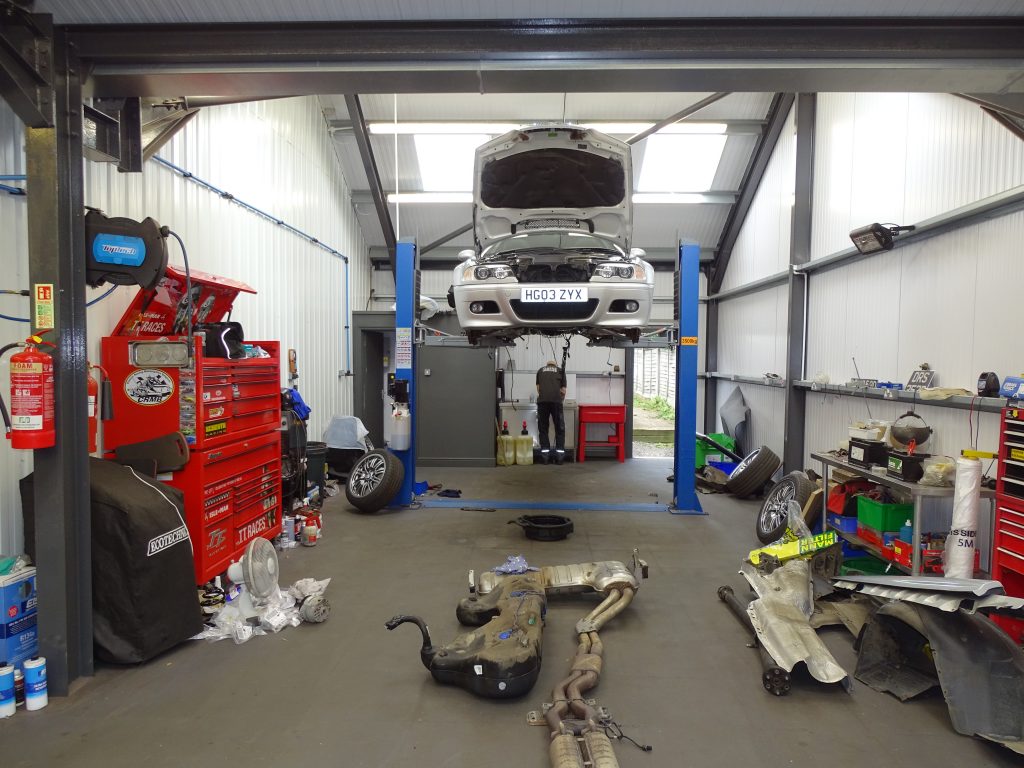
Ouch – and a few more expletives that are unfit for publication. When the M3 finally came back from its near-six-moth sojourn at Classic Heroes, a BMW specialist in Sussex, it brought with it a bill.
Well, I say that, it didn’t exactly bring it home. I had to settle it on collection. And that’s when my knees went a little wobbly and I had to have a little sit down.
Let’s not spoil the surprise now, though. Instead, let this be a cautionary tale for all those who are taken by the idea of buying a modern-classic car.
More often than not, on the surface modern classics present beautifully for their age, and appear clean and tidy when you rummage around below. They are the sort of car that have been selling like hot cakes recently, as a mixture of 30–, 40– and 50–somethings snap them up for driving pleasure and – who knows – maybe even a pension contribution come retirement age
It’s feasible, then, you could find yourself bidding for on an online auction site, or haggling over buying with a private seller, or going through a car’s history file with a trader. In your mind, you’re imagining the car won’t need for much, right?
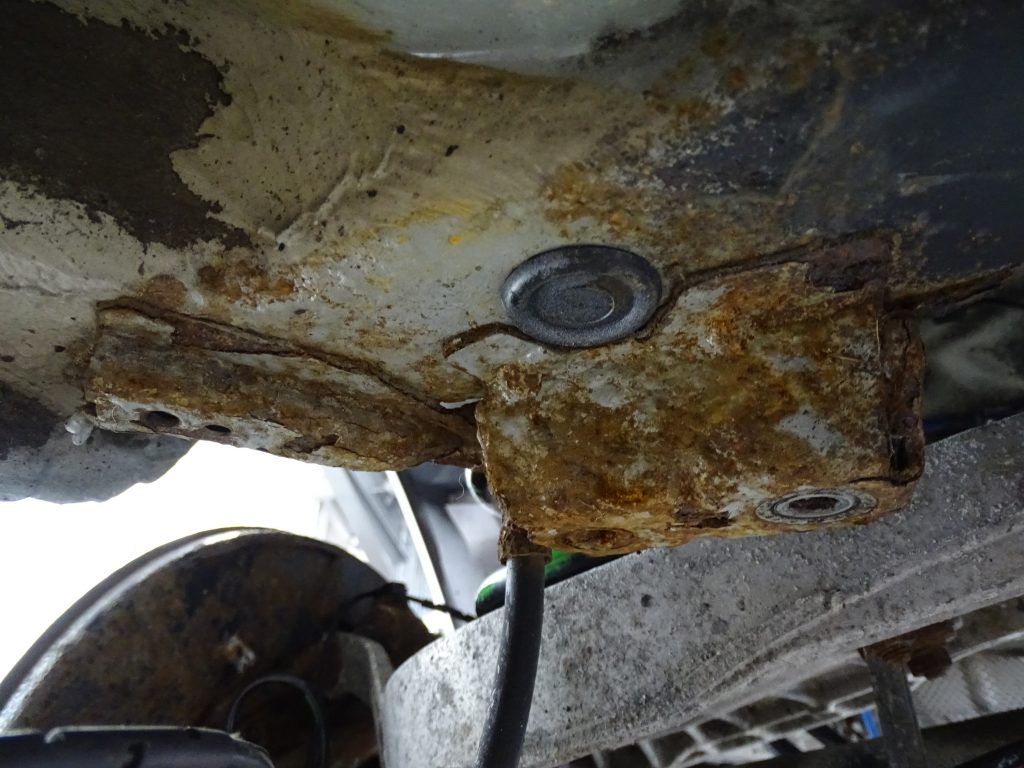
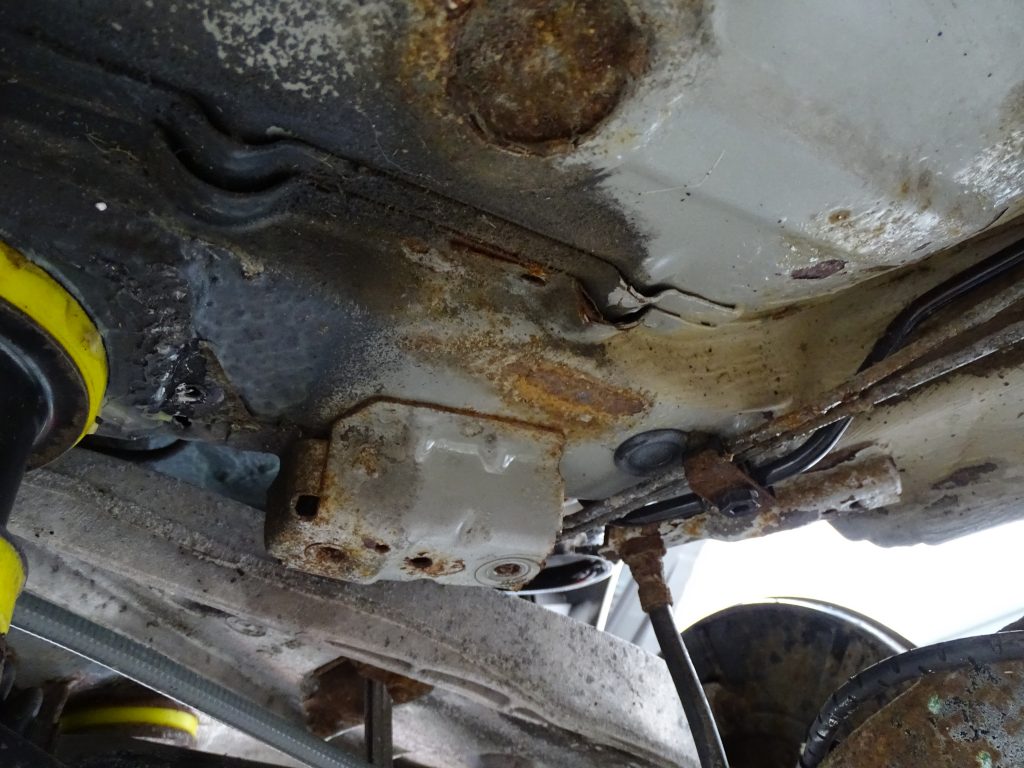
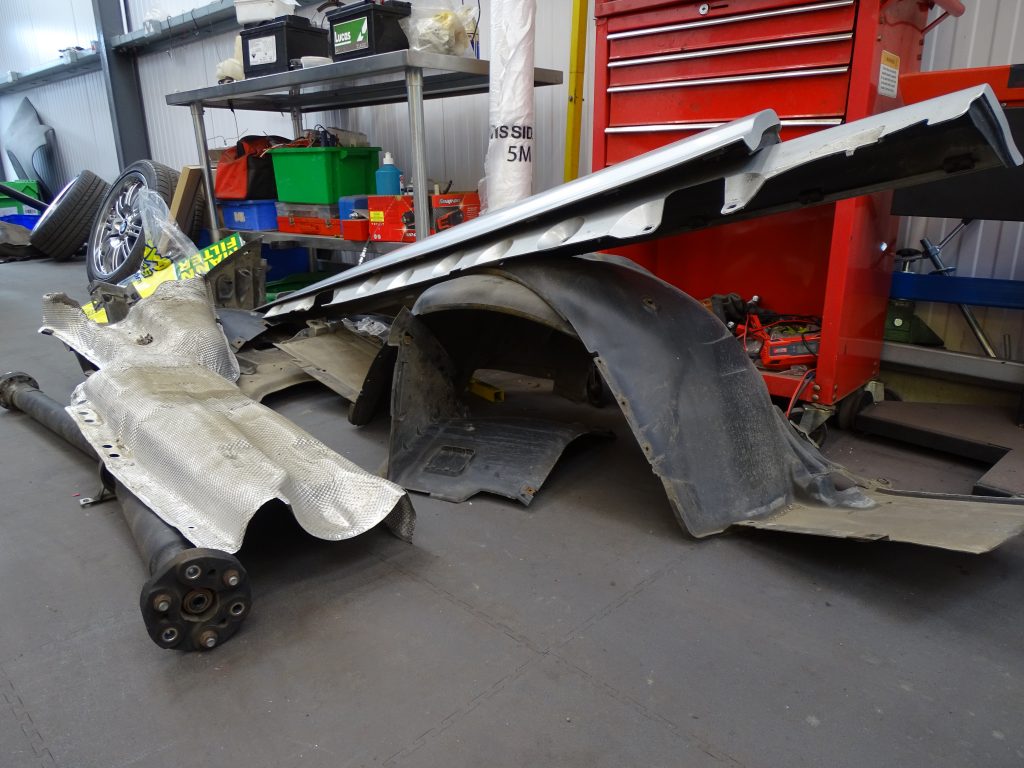
Wrong. My M3 had been on the road for 16 years when I bought it. In that time it had clocked up 71,000 miles or so, in all weathers. It was, as its makers at the Bayerische Motoren Werke intended, a daily-driver, a performance car that could be used 24/7, 365, rain or shine, snow or salted roads.
Once the underside of the M3 had been fully exposed – by which I mean absolutely everything that could be removed was removed – the rust was there for all to see. It would take many hours of arduous work with a wire wheel to take any affected areas back to bare metal. Then came a host of Dinitrol products, including rust treatment, anti-stone chip, seam sealer and cavity wax. Into the mix, so to speak, went Titaninum Silver paint.
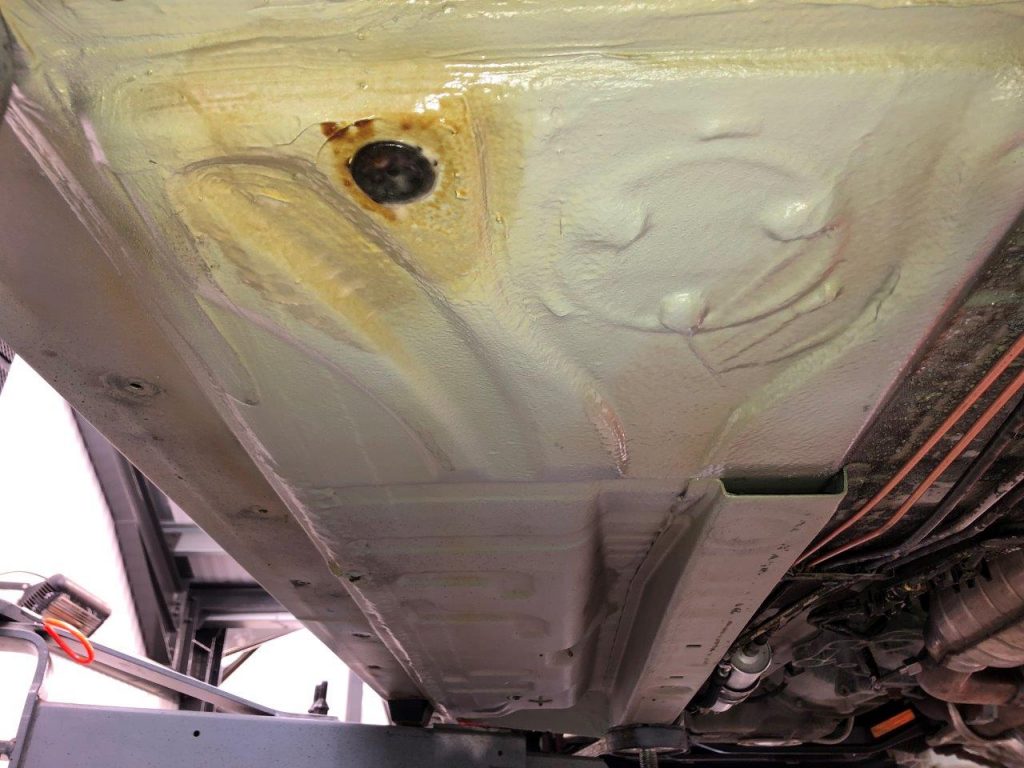
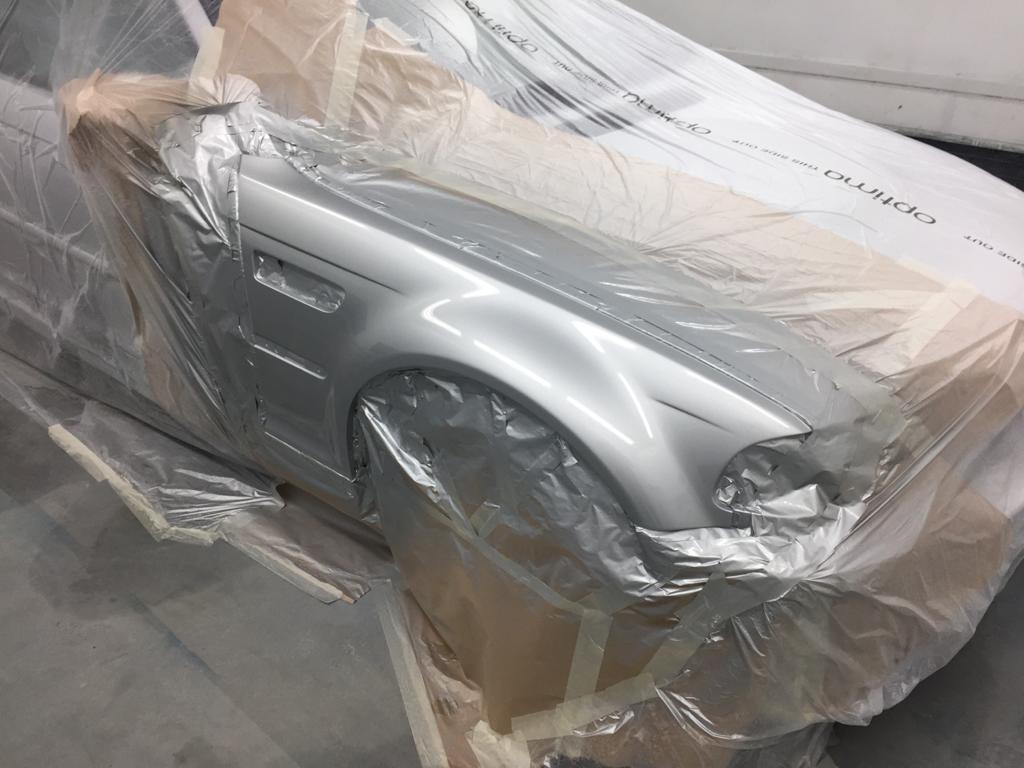
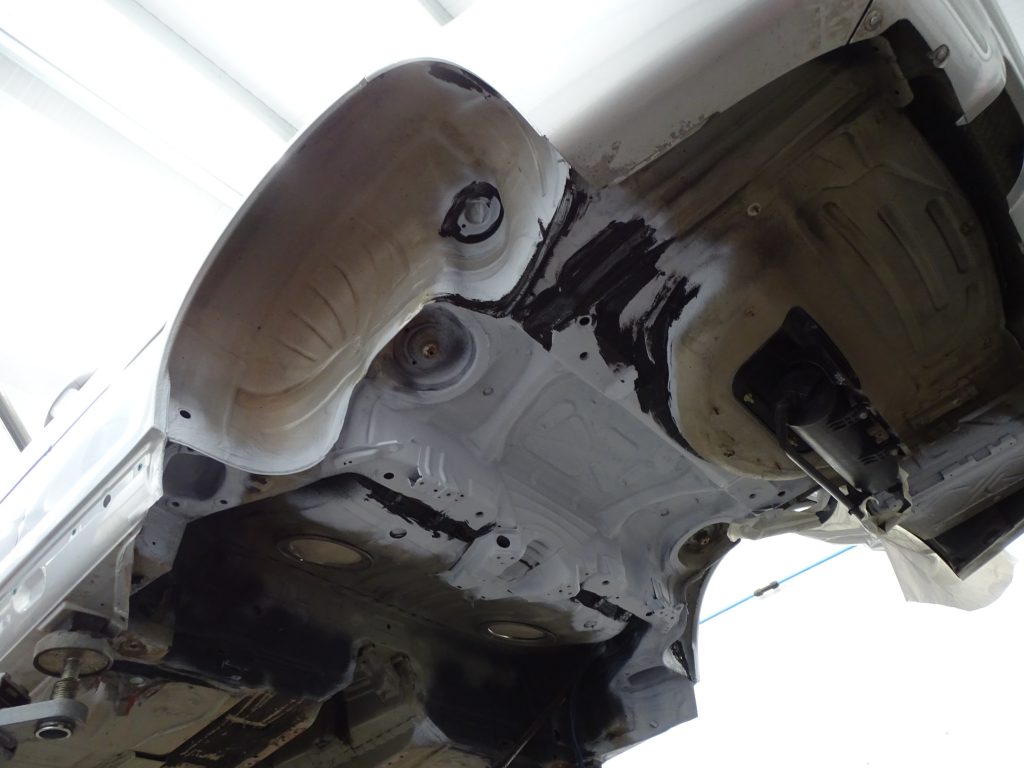
During that time, a new spring and new set of dampers were fitted, a new front wing was bought and fitted and then it had to pay a visit to the paint shop to have the new wing matched and the other wing returned to full health.
This is all labour and time intensive work – a mini restoration, if you will, which at least should mean that in years to come the car doesn’t require a full and more costly restoration because so much preventative maintenance has been performed.
And as we all know, time and labour cost money. I haggled for all I was worth on the labour rate at the start of the project, but despite that, the final bill came to just over £5,300.
Weighed against the original purchase price of the car – £13,250 – that may seem like a lot to many. But I prefer to view it in the wider context. (Hell, I have to say that, right?) I now have a car with an underside that is almost as good as new, and protected against future use come rain or shine, and that will mean I can sleep better at night knowing it won’t be turning to a pile of rusty flakes every time I drive it.
It should also make it significantly more attractive to any sensible prospective buyer than a comparable M3 that’s not had such work carried out.
But that’s not the plan. The plan is to enjoy the car and then hand it over to the next generation of Mills’ to enjoy. Assuming legislation lets them do as much, decades down the road.
7 December, 2021: Easy glider
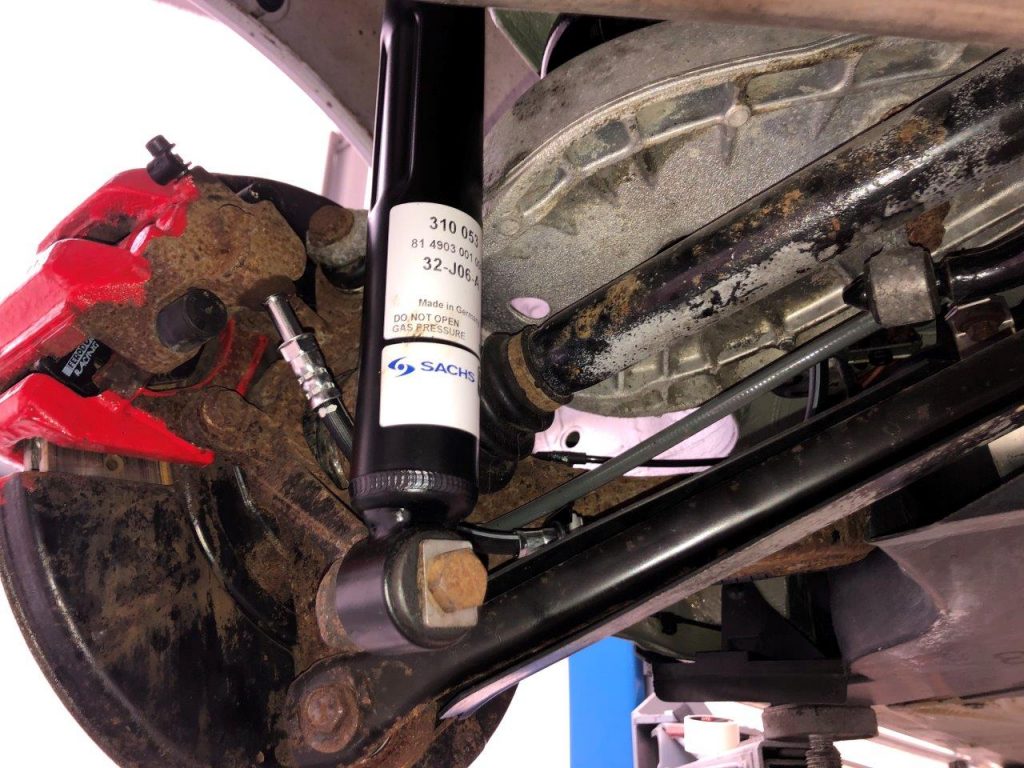
When I made the decision to save my BMW M3 from the R-word that shall not be spoken – yes, you know the word I mean – I knew two things: that it required a replacement rear spring, as one was cracked; and that returning the underside of the car to respectable condition would be futile if the car didn’t drive as well as it did the day it rolled out of Regensburg.
Clearly, the cracked driver’s side rear spring would have to be binned and a new spring fitted. And clearly, M3 E46 rear springs don’t come for free. At the time of the work being done, last autumn, it cost £113.
However, because the rear subframe was being removed during the rust-prevention (damn, I said the R-word) treatment, it made sense to switch the year-old polyurethane bushes to original equipment items. Now, fellow M3 enthusiasts, forgive me at this point, as I appreciate that this flies in the face of convention. Many owners of an M3 E46 tend to switch the subframe to poly bushes, because they believe it will improve control of the rear suspension and, in turn, make the car handle better.
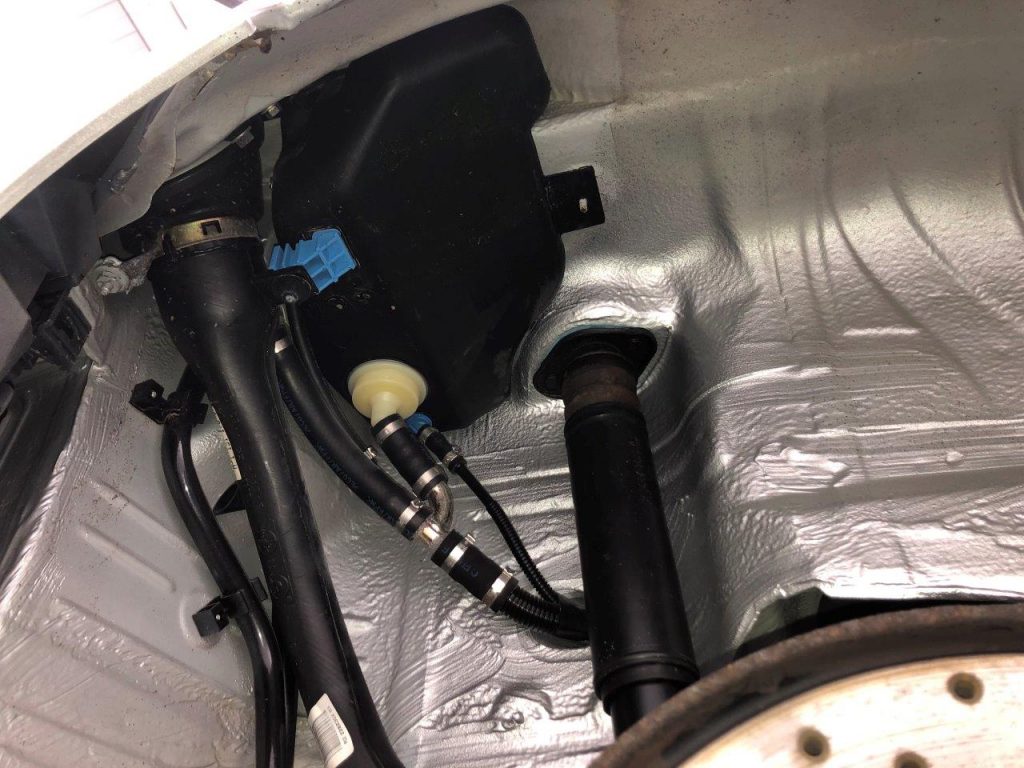
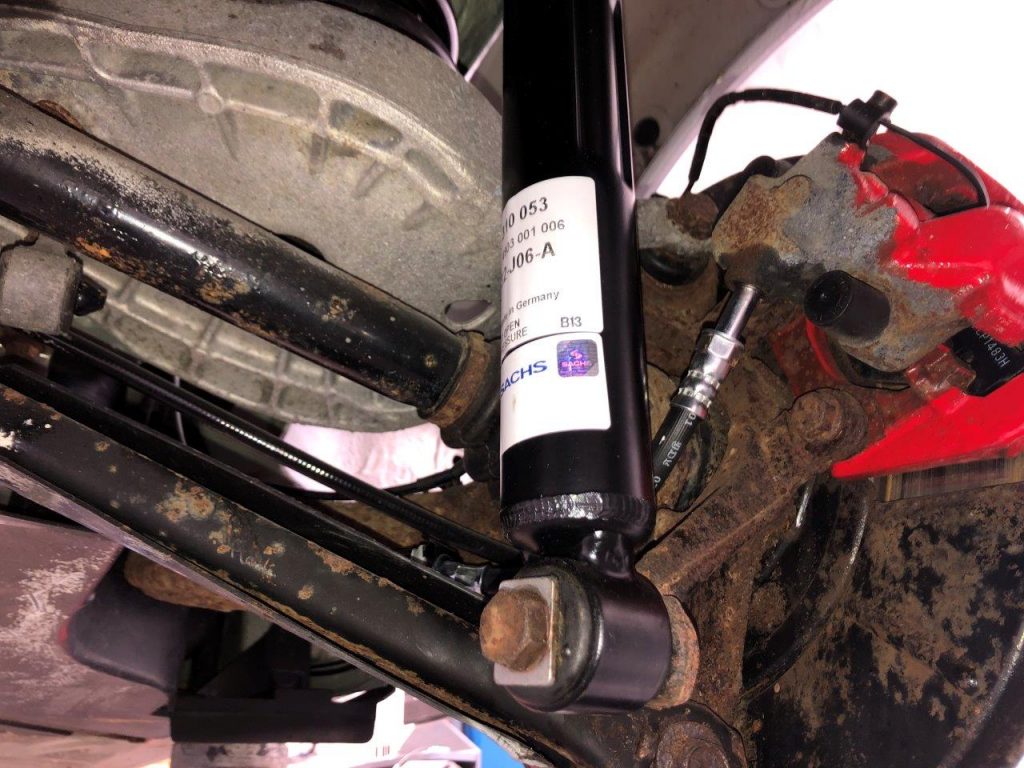
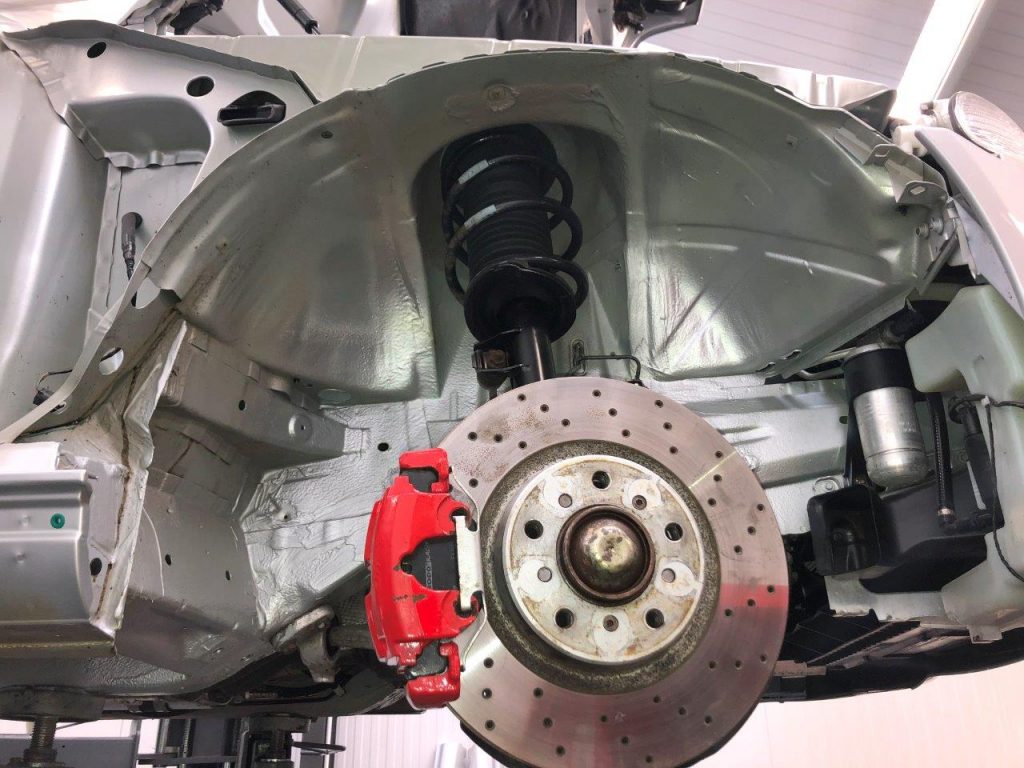
But here’s the thing. Those that worship at the altar of the poly bush may be able to notice that control on a race track, but on the road all I could tell was that the ride comfort had been compromised. As I winced during fast, sharp compressions, my spine told me as much.
So the perfectly good poly bushes were binned in favour of original BMW rubber items, at £128 for the four mounting points.
That just left the business of a fresh set of dampers. The original items are made by Sachs, and at the time cost £200 for the front pair, and £156 for the two rears. Sachs dampers are of the gas pressure, twin-tube type, and seeing them go on to a car that’s covered 74,000 miles over 17 years, and weighs a not inconsiderable 1570kg, gave me a curious, warm fuzzy feeling, as I felt pretty confident it would make a noticeable difference to the way the car felt on the road.
Sure enough, the combination of changes did make themselves felt. The original characteristics of compliance with control were back. The M3 felt more forgiving at speed, but, in my view, no less entertaining for it.
I’ll admit it was a costly exercise but compared with the overall sum of cash I was showering the M3 with, it was relatively little. And every time I drive the car, I can feel the benefit.
7 June, 2022: From Zero to hero?
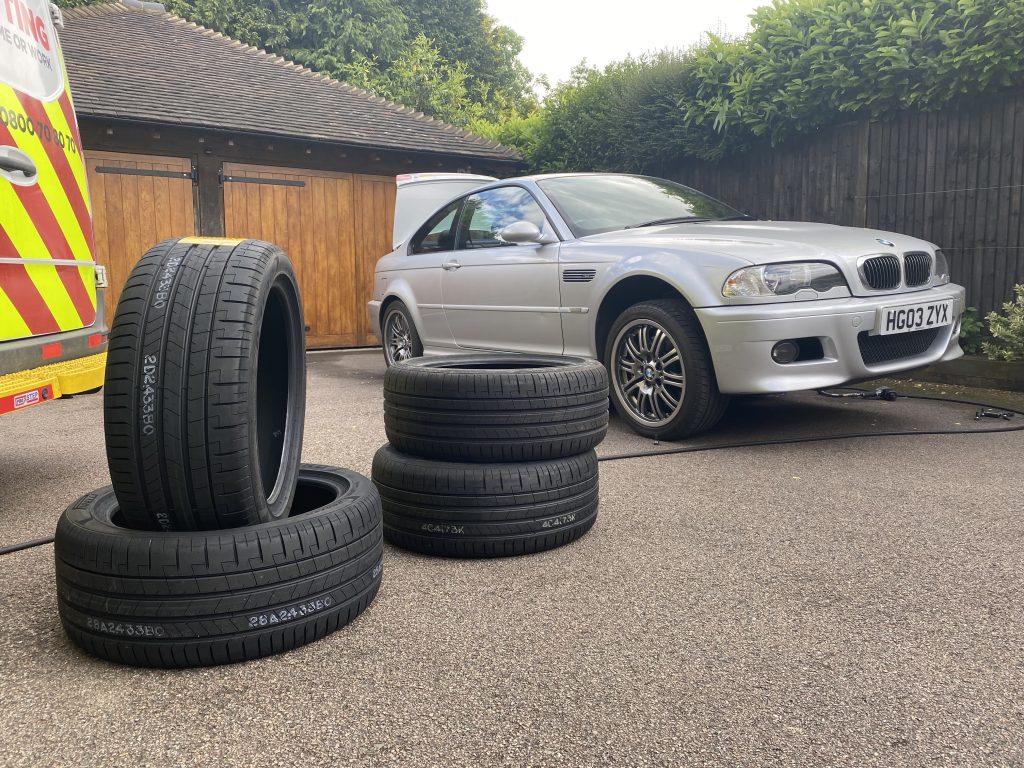
I recently wrote, well, whinged, about the first-world problems of being able to source the correct size of tyre for my modern-classic Beemer. It was a protracted and somewhat painful process, made all the more protracted and painful by the technology and data that is supposed to make our lives simpler.
The issue was this: The Continental Sport Contact tyres on the M3 looked as good as new but were, in fact, two decades old. They’d been supplied with a new M3 on 18 inch wheels, which was swiftly part-exchanged for something else (my guess? Porsche 911) and the dealer then sold the M3 to a customer who wanted the M3’s popular 19-inch wheels, so they bought-in a set of 19s, removed the 18s and left them on a pallet in their warehouse for years to come.
Despite my desire to keep my wallet closed at all times, I knew deep down that the tyres needed changing. Because, you know, what if…
My research led me to the Pirelli P Zero PZ4, because it had won the 2022 tyre test that evo magazine publishes. Then came the fun and games of trying to find the right sizes (225/45 at the front and 255/40 at the back – and most definitely NOT run-flat) in stock and with a supplier that’s offering a deal. Eventually, after several weeks of trying, the magic combination clicked into place, I secured a 15 per cent discount offer (hey, every little helps – it knocked £114 off the price, reducing the pain to a reasonable £668 for a set) via National Tyres’ online site, and the lads from National turned up to fit them.
There then followed the dance of the sidewall, whereby I led the chaps around the entirely unblemished alloy wheels and begged/pleaded/ordered that they must not mark them, or they’d bear witness to a grown man rolling around on the floor having a tantrum like a three-year old.
Tyres fitted, first drive under my belt, I’d like to say the PZ4s are a revelation. But it’s early days yet. I’ve only driven them in the wet. What I could appreciate was a slightly more natural feel through the steering and noticeably better bump-absorption. But as for the levels of grip, and the all-important transition from grip to whoa-here-we-go-slip, further assessment is required.
Which, I can assure you, will be no hardship.
However, the balancing of the front wheels is now out. That’s annoying, as I specifically asked the fitters to get it ‘spot on’, and the next big run for the M3 is a trip the Le Mans Classic weekend. I suspect I’ll have to take it to my local tyre fitter to have the fronts balanced properly. Told you having tyres fitted is annoying…
20 Dec, 2022: Why does the MOT fill us with dread?
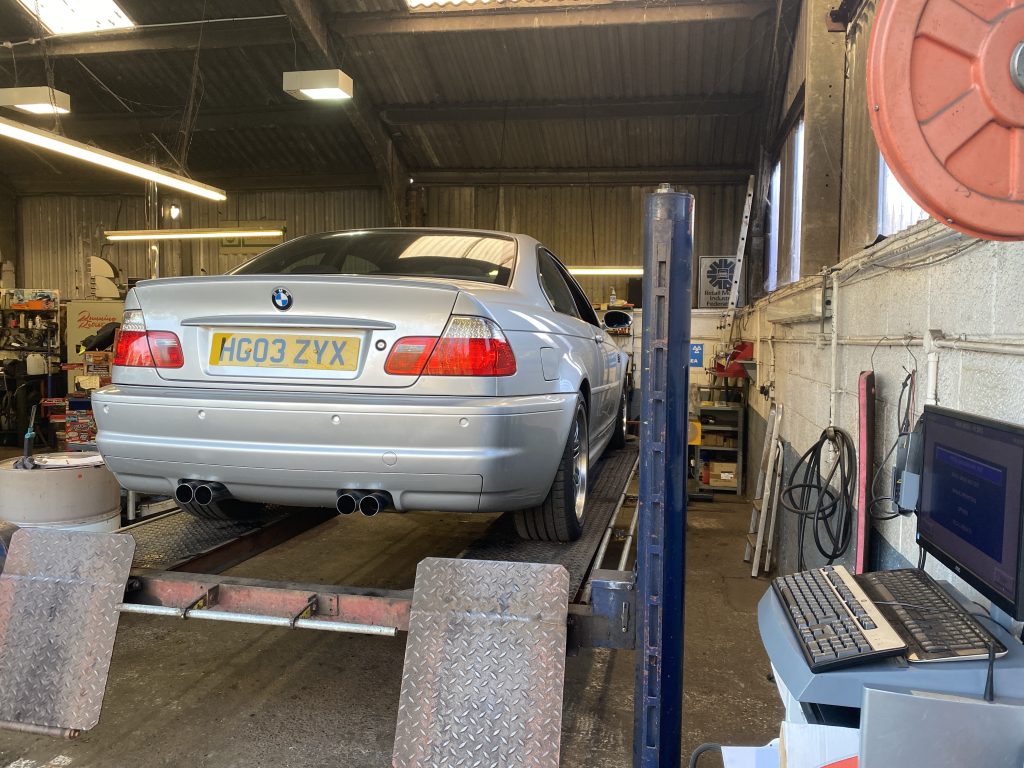
I don’t think I’m alone in dreading the MOT. I’m all for the annual health check, but find myself struggling to sleep the night before, my mind plagued by visions of worn track rod ends, faulty headlamp washers, cracks spreading across the windscreen like special effects from a horror film and overall-clad geezers sucking their teeth, shaking their head and muttering something about how it’s going to be expensive but they’re not even sure they’ll be able to get the parts in the way things are at the moment…
Snap out of it!
As it was, I took the M3 E46 along to Kent’s highest independently rated garage. Well, it is according to The Good Garage Guide, a fact I only spotted when going online to leave a review. Kemp & Partners in Sandhurst, Kent, is the sort of distance from home that is just far enough for the engine oil to get warm. I’d given it a try when having an MOT inspection for my daughter’s Renault Twingo, and found the family team such a friendly, professional and enthusiastic bunch I thought I’d take the M3 down for its MOT.
David Kemp reckoned right when he thought I’d like to follow him around as he performed the MOT. First job was to set the headlight levels. I was glad to hear they were a little low, as cars of the BMW’s era (2003) have early Xenons that were never all that effective at lighting the road on dipped beam, so gaining a little more length for the light beam is good news in my book, and a simple job involving turning a knurled wheel behind the lamp unit while checking the height using a Boston beam testing unit.
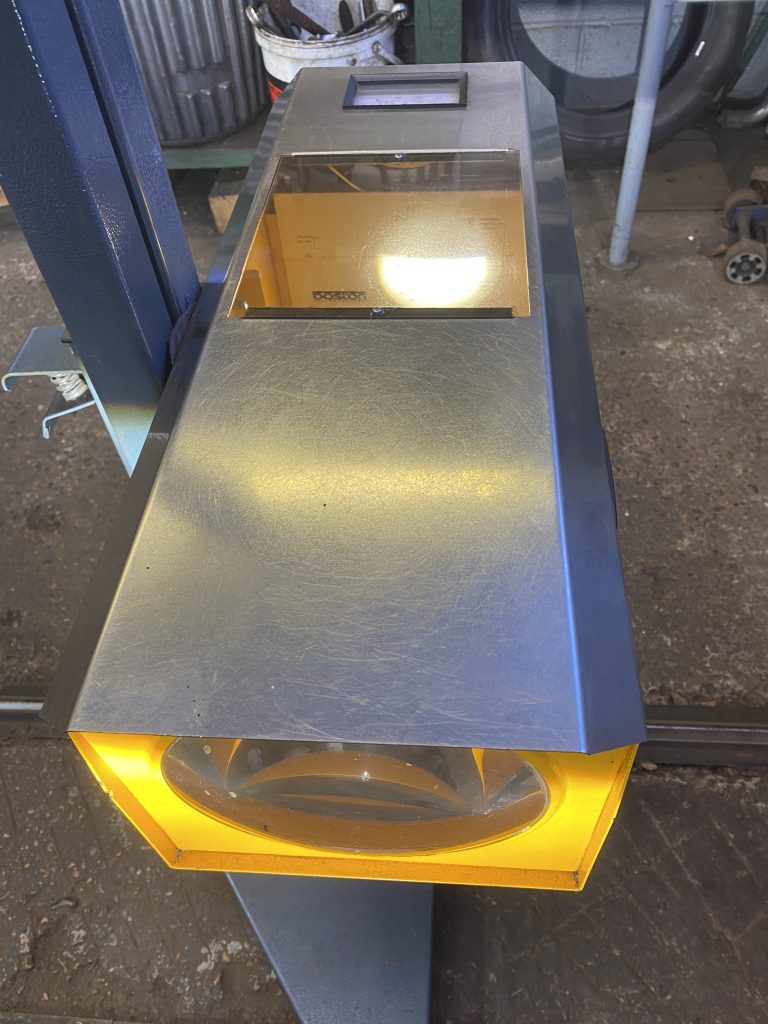
From there, bar a slightly sticky bonnet catch, it was a case of good news all round, with David praising the condition of the car, before giving me one tip to keep it, well, tip-top. As previously reported, I’ve had the underside of the car restored to rid it of any surface corrosion, but that didn’t extend to all the suspension components. David’s suggestion was to go over it this winter with cans of spray grease and a rag, which will help remove any surface rust, lubricate adjustable parts and protect it against water, salt and gunk until I do it all again next winter.
So I have ordered a few cans of DriveTec Spray Grease (clear) and will be jacking the car up, getting it on axle stands, throwing some cardboard on the floor and overalls on myself, pulling on a headtorch and getting this simple bit of preventative care carried out.
Meanwhile, the Pirelli P-Zero PZ4 tyres that I forked out a small fortune for are still, ahem, undergoing assessment, as I haven’t have much of a chance to really push them hard in dry conditions. That said, I did get the wheels balanced correctly by a local fitters’, after the mobile unit that came to me didn’t get them spot on. It’s a small, cheap job but it would drive me mad if they weren’t perfectly balanced.
Tweet to @squarejames Follow @squarejamesM3 fan? Bookmark this page as James will regularly report on his BMW M3 E46.
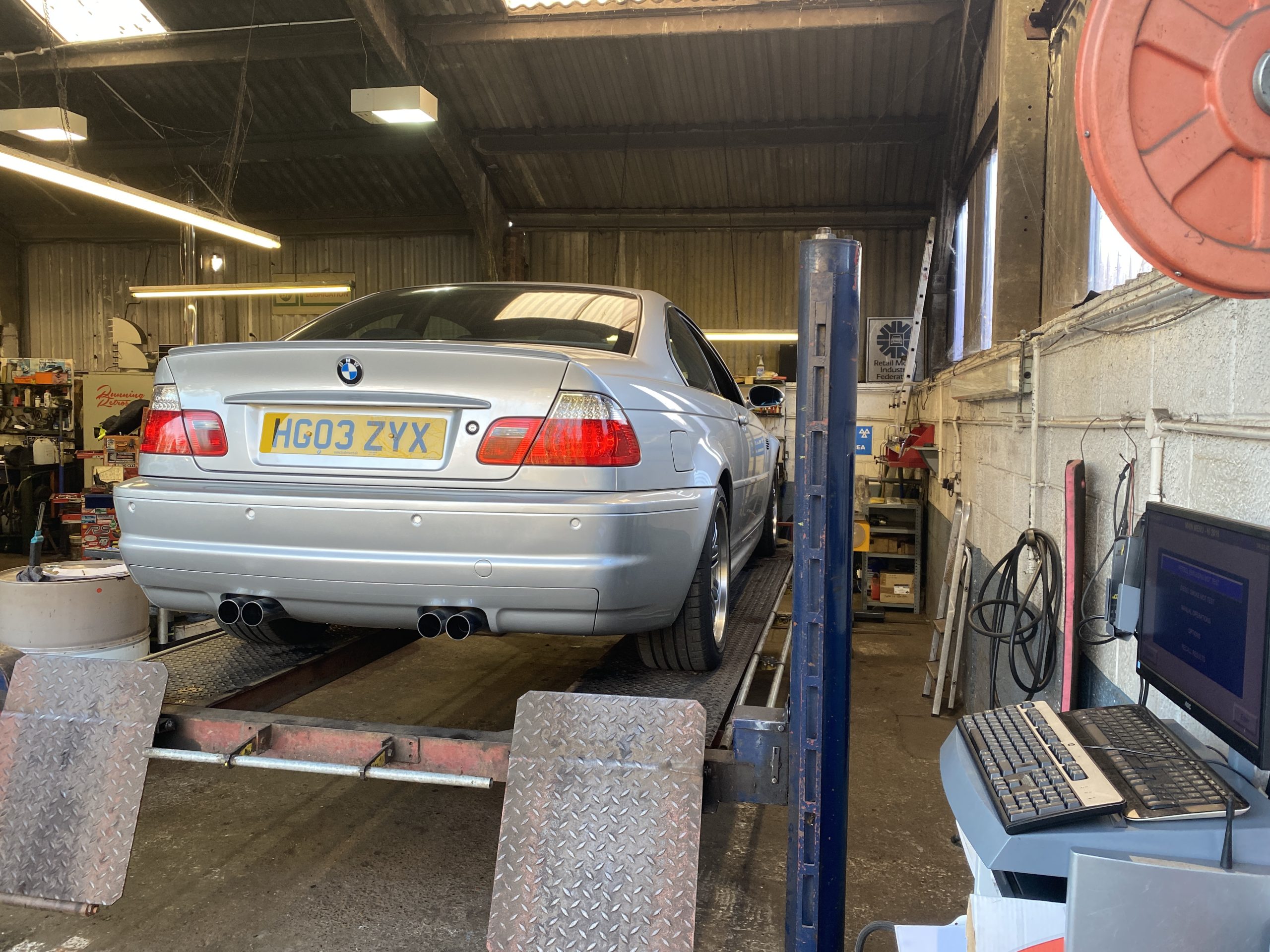








Any more updates on the E46 M3?